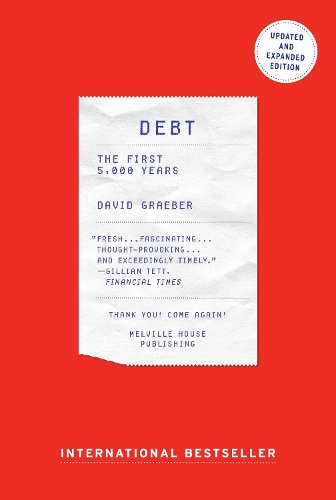
Debt: The First 5000 Years
(Paperback, 2nd Revised edition)
Available Formats
Publishing Details
Debt: The First 5000 Years
By (Author) David Graeber
Melville House Publishing
Melville House Publishing
2nd February 2015
6th November 2014
2nd Revised edition
United States
Classifications
General
Non Fiction
332.09
Physical Properties
Paperback
560
Width 142mm, Height 212mm
521g
Description
A revised and updated edition of the international bestseller. Graeber, one of the early organisers of Occupy Wall Street and a well regarded academic, presents a stunning reversal of conventional wisdom; he shows that before there was money, there was debt. For more than 5000 years, since the beginnings of the first agrarian empires, humans have used elaborate credit systems to buy and sell goods, long before the invention of cash. It is in this era, Graeber argues, that we first see a society divided between debtors and creditors.
Reviews
Winner of the Bateson Book Prize awarded by the Society for Cultural Anthropology One of the year s most influential books. Graeber situates the emergence of credit within the rise of class society, the destruction of societies based on webs of mutual commitment and the constantly implied threat of physical violence that lies behind all social relations based on money. PaulMason, "The Guardian" The book is more readable and entertaining than I can indicate... It is a meditationon debt, tribute, gifts, religion and the false history of money. Graeber is a scholarly researcher, an activist and a public intellectual. His field is the whole history of social andeconomic transactions. " "Peter Carey," The Observer" "An alternate history of the rise of money and markets, a sprawling, erudite, provocative work." Drake Bennett, "Bloomberg Businessweek " "[A]n engaging book. Part anthropological history and part provocative political argument, it's a useful corrective to what passes for contemporary conversation about debt and the economy." Jesse Singal, "Boston Globe" "Fresh... fascinating... Graeber s book is not just thought-provoking, but also exceedingly timely." Gillian Tett, "Financial Times" (London) "Remarkable." Giles Fraser, "BBC Radio 4" "Terrific... In the best anthropological tradition, he helps us reset our everyday ideas by exploring history and other civilizations, then boomeranging back to render our own world strange, and more open to change."" "Raj Patel, ""The Globe and Mail"" "An amazing debut conversational, pugnacious, propulsive"" ""Times Higher Education" (UK) "Graeber's book has forced me to completely reevaluate my position on human economics, its history, and its branches of thought. A Marxism without Graeber's anthropology is beginning to feel meaningless to me." Charles Mudede, "The Stranger" "The world of borrowing needs a little demystification, and David Graeber's"Debt "is a good start." "The L Magazine" "Controversial and thought-provoking, an excellent book." "Booklist" "This timely and accessible book would appeal to any reader interested in the past and present culture surrounding debt, as well as broad-minded economists." "Library Journal" Praise for David Graeber I consider him the best anthropological theorist of his generation from anywhere in the world. Maurice Bloch, Professor of Anthropology at the London School of Economics "A brilliant, deeply original political thinker." Rebecca Solnit, author of"A Paradise Built in Hell" If anthropology consists of making the apparently wild thought of others logically compelling in their own cultural settings and intellectually revealing of the human condition, then David Graeber is the consummate anthropologist. Not only does he accomplish this profound feat, he redoubles it by the critical task now more urgent than ever of making the possibilities of other people s worlds the basis for understanding our own. Marshall Sahlins, Charles F. Grey Distinguished Service Professor Emeritus of Anthropology and of Social Sciences at the University of Chicago "From the Hardcover edition.""
Author Bio
David Graeber (1961-2020) was a professor of anthropology at the London School of Economics. One of the original organizers of Occupy Wall Street, Graeber was also the author of Utopia of Rules and wrote widely for publications such as The Guardian, Harper's, The Baffler, n+1, The Nation, The New Inquiry, and The New Left Review.
